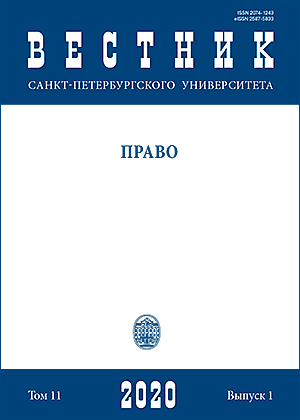Memorial laws as a instrument for the legitimization of power
DOI:
https://doi.org/10.21638/spbu14.2020.116Abstract
The use of memorial topics in the normative and legal acts of different epochs since the 17th century and the allocation of memorial laws as a specific type of laws in the late 20th century is illustrated in the article. The author’s definition of memorial laws is provided as a special type of laws that regulate social relations which have been developing in the process of preservation or overcoming memory of specific historical events, they form positive or negative attitude towards these events and contain dispositive or mandatory norms regarding the possibility of interpreting facts and phenomena of the past. The reasons for updating the memorial legislation since the 1990s are revealed, such as the memory of two world wars, the collapse of a number of states, the emergence of an intercivilizational confrontation, and the existing postwar system of world order, which currently does not suit a number of countries. A typology of memorial laws according to the legal entity of legislative initiative and on the character of the norms being established is provided in the article. Both types and subtypes of memorial laws are shown. The article contains an overview and description of Russian and foreign studies devoted to the development of memorial legislation and its evaluation. Special attention to the analysis of scientific research in the countries of the post-Soviet space is provided. Various possibilities for using memorial laws as a tool to legitimize power are considered: the destruction of the old integration space with the collapse of states; building a new unified political, economic and cultural space which can be hampered by the events of the past; the weakness of state authority, which seeks to be justified by the events of the past; national movements, etc.
Keywords:
memorial laws, historical events, social shocks, collective memory, world legal order, international organizations, rules law
Downloads
References
Downloads
Published
How to Cite
Issue
Section
License
Articles of "Vestnik of Saint Petersburg University. Law" are open access distributed under the terms of the License Agreement with Saint Petersburg State University, which permits to the authors unrestricted distribution and self-archiving free of charge.






